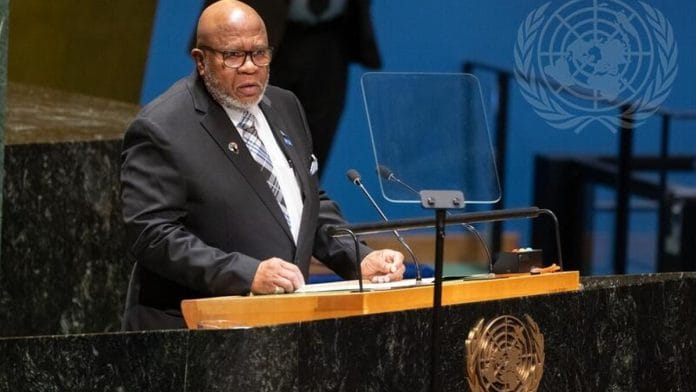New Delhi: United Nations General Assembly (UNGA) President Dennis Francis impassionedly defended the world body against claims that it is no longer “effective”, while speaking at an event in New Delhi Wednesday. He distinguished the work of the General Assembly from the “paralysed” Security Council, adding that UN personnel on the ground in war-torn Gaza are so committed that some took their children to work during Israeli airstrikes.
“Bilateral political tensions get imported and contaminate the work of the [UN Security] Council…It gives the impression that the UN is insensitive to what is going on in the ground in Gaza and other theatres of military action. That’s not the truth,” said Francis while delivering a lecture hosted by think tank Indian Council of World Affairs (ICWA).
“UN personnel in Gaza, when bombs started dropping, were taking young children to work with them. Do you know why? They did not want to risk leaving their children at home. Their preference was — “If I have to die, I want to die with my children.” That is the level of commitment. While the bombs were dropping, the UN personnel were doing their service of humanity,” the UNGA President added.
Over a 100 aid workers from the UN have died in Gaza.
The UNGA President’s remarks come as the Security Council convenes in New York for a meeting where humanitarian aid to Gaza, the future of a Palestinian state and a ceasefire are likely to dominate discussions.
The Israel-Hamas war has crossed 100 days, and claimed the lives of over 20,000 Palestinians with several Israeli hostages still in the hands of Palestinian militant group Hamas. Meanwhile, attacks from Yemen’s Houthi rebels in the Red Sea — as a gesture of solidarity with Hamas — has increased fears of a possible spillover of a regional war.
Last month, the UN Security Council passed a resolution on increased aid delivery to Gaza but only after many previous resolutions failed passage, one due to a US veto.
“It took a resolution from the General Assembly to motivate the Security Council enough to agree a resolution on Gaza [for humanitarian aid] after 4 or 5 attempts,” said Francis.
“There is a lot of disaffection and rightly so, with the Council. It’s not fit for purpose in 2024. The geopolitics has changed,” he added.
In his opening remarks, the UNGA President praised Indian humanitarian aid and medical supplies to Palestine and apart from Gaza, also pointed to other conflict-hit countries like Ukraine, Yemen, Myanmar, Sudan and Haiti that require global attention.
He flagged rising debt levels in developing countries as an area of concern, and pushed for reform of the UN and other multilateral organisations especially after the inclusion of the African Union (AU) in the G20. Currently, India, Brazil and other developing countries have been pushing for a permanent seat on the UN Security Council.
Also Read: Israel war on Gaza has gone beyond ‘right to self-defence’ to ‘responsibility to protect’
‘UN Security Council paralysed’
As seen in the wars in Ukraine and Gaza, UN Security Council resolutions have often failed passage due to differing views from blocs within the body. Currently, there are five permanent members — China, Russia, France, US and the UK — and 10 non-permanent members.
“It undermines trust and confidence in the system on top of which you have a Security Council paralysed to take decisions that it is mandated to take on behalf of the international community,” Francis told a packed audience in Sapru House.
“What tends to happen in the public domain is that the UN gets judged to a significant degree, based on the performance of the Security Council. But the UN is more than the Security Council,” he added.
Last October, the UNGA passed a resolution for a humanitarian truce in Gaza, with 120 votes in support, 14 against (including the US and UK) and 45 abstentions, including India.
Then in December, the UNGA passed another resolution on more aid for Gaza which received more votes in favour. India was one of the 153 countries that voted in support.
Resolutions passed in the General Assembly, however, are non-binding.
(Edited by Gitanjali Das)






